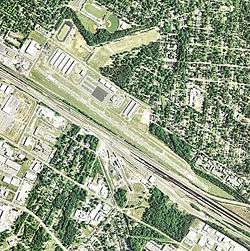Jim Hamilton–L.B. Owens Airport
| Jim Hamilton–L.B. Owens Airport | |||||||||||
|---|---|---|---|---|---|---|---|---|---|---|---|
 | |||||||||||
|
2006 USGS airphoto | |||||||||||
| IATA: CUB – ICAO: KCUB – FAA LID: CUB | |||||||||||
| Summary | |||||||||||
| Airport type | Public | ||||||||||
| Owner | County of Richland | ||||||||||
| Serves | Columbia, South Carolina | ||||||||||
| Elevation AMSL | 194 ft / 59 m | ||||||||||
| Coordinates | 33°58′14″N 080°59′43″W / 33.97056°N 80.99528°W | ||||||||||
| Website | RichlandOnline.com/... | ||||||||||
| Map | |||||||||||
 KCUB Location of Jim Hamilton–L.B. Owens Airport | |||||||||||
| Runways | |||||||||||
| |||||||||||
| Statistics (2009) | |||||||||||
| |||||||||||
Jim Hamilton–L.B. Owens Airport[2] (IATA: CUB, ICAO: KCUB, FAA LID: CUB) is a county-owned public-use airport located two nautical miles (3.7 km) south of the central business district of Columbia, in Richland County, South Carolina, United States.[1] In 2008, the airport was renamed in honor of former airport manager Jim Hamilton.[3] It was formerly known as Columbia Owens Downtown Airport.
History
The airport was the main municipal airport serving Columbia, South Carolina, prior to World War II. It was named Columbia Municipal Airport, and on April 24, 1930, the new airport was dedicated.[4] In celebration, an airshow with more than 15,000 people attending saw notable aviators like the President of the Curtiss Flying Service, Casey Jones, Bill Winston (the flying instructor of Charles Lindbergh), and Elliot White Springs.
Eastern Air Transport began passenger and airmail service to Owens Field in 1932. Delta Air Lines began its first scheduled services out of Columbia's new airport in 1934.
Just prior to World War II, some Air Corps operations from the 65th Observation Group flew observation flights from the airport, until Columbia Army Air Base opened in 1941. During the war, it was used by the Army Air Forces Third Air Force as a training field for reconnaissance and observation pilots while remaining a commercial airport. It also served as a military airport, serving the needs of Fort Jackson. President Franklin D. Roosevelt landed at Columbia Airport during a visit to Columbia. The United States Navy also used Owens Field as a military airport. In addition, the military officials at the airport controlled a Prisoner of War Camp at Walterboro, where some 350 POWs were sent who worked on farms and other tasks. After the war, the airport returned to commercial use.[4]
After the war, the airport was renamed Owens Field for Columbia Mayor Lawrence B. Owens, who was one of the most ardent supporters of a municipal airport. Owens Field remained the commercial airport for Columbia until airline service was relocated to the larger Columbia Metropolitan Airport near Cayce in 1947 when the Air Force released its former World War II base to Lexington County. Since then Owens Downtown Airport has served the general aviation community of Columbia and the midlands. [5]
Facilities and aircraft
Jim Hamilton–L.B. Owens Airport covers an area of 182 acres (74 ha) at an elevation of 194 feet (59 m) above mean sea level. It has one runway designated 13/31 with an asphalt surface measuring 5,011 by 75 feet (1,527 x 23 m).[1]
For the 12-month period ending November 19, 2009, the airport had 56,000 aircraft operations, an average of 153 per day: 92% general aviation, 6% air taxi, and 2% military. At that time there were 126 aircraft based at this airport: 81% single-engine, 15% multi-engine, 1% jet and 3% helicopter.[1]
See also
References
![]() This article incorporates public domain material from the Air Force Historical Research Agency website http://www.afhra.af.mil/.
This article incorporates public domain material from the Air Force Historical Research Agency website http://www.afhra.af.mil/.
- 1 2 3 4 FAA Airport Master Record for CUB (Form 5010 PDF). Federal Aviation Administration. Effective 29 July 2010.
- ↑ "Jim Hamilton - L.B. Owens Airport". Richland County, South Carolina. Retrieved 17 August 2010.
- ↑ Santaella, Tony (December 30, 2008). "Airport Gets Renamed--Again". WLTX.com.
- 1 2 Osbourne, Richard E (1997), World War II Sites in the United States: A Tour Guide & Directory, ISBN 0962832413
- ↑ History of Owens Field
External links
- Jim Hamilton L.B. Owens Airport (CUB) information from SC Division of Aeronautics
- Eagle Aviation, the fixed-base operator (FBO)
- Aerial photo from USGS The National Map
- FAA Terminal Procedures for CUB, effective November 10, 2016
- Resources for this airport:
- FAA airport information for CUB
- AirNav airport information for KCUB
- ASN accident history for CUB
- FlightAware airport information and live flight tracker
- NOAA/NWS latest weather observations
- SkyVector aeronautical chart, Terminal Procedures

.svg.png)